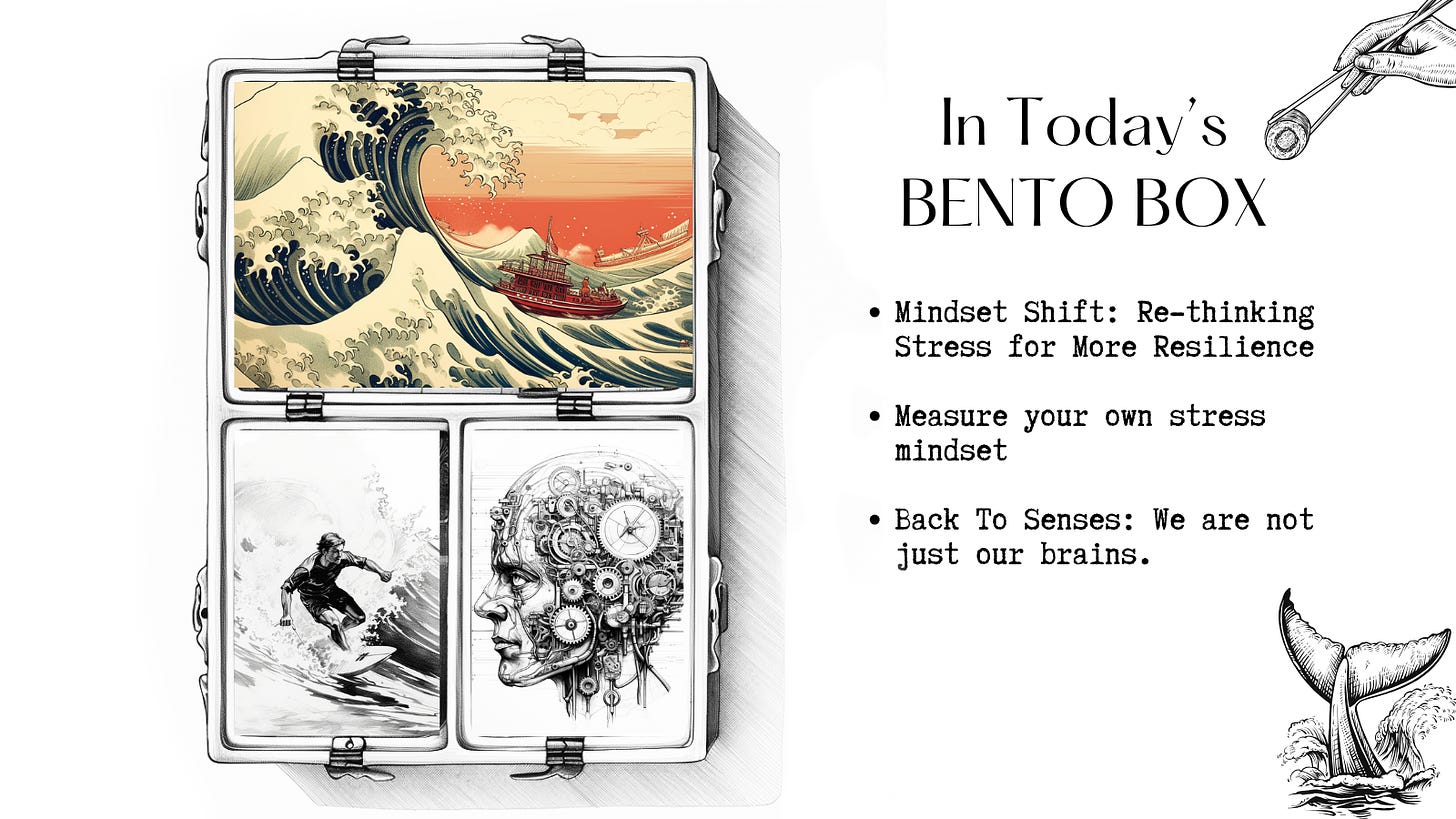People stress out about stress.
Stress, a word that instinctively tightens our muscles and accelerates our heart rate, might just be the secret ingredient to our personal and professional growth.
"The greatest weapon against stress is our ability to choose one thought over another."* - William James
Thinking about the benefits of stress can improve your response to stress.
Stanford psychologist Kelly McGonigal introduces a paradigm shift, suggesting that stress, when embraced, can be a catalyst for enhancing our intellect, strength, and happiness. (Read more about her insights.)
According to her research, stress can make us stronger, smarter, and happier, but only if we learn to embrace it.
Kelly’s pal from Stanford, Alia Crum, argues that pursuing a "stress-free" life can lead to more stress in the future and prevent overcoming challenges.
This perspective challenges the conventional wisdom that advocates for a stress-free life, a pursuit that might be not only unrealistic but also counterproductive.
This avoidance strategy, while providing temporary relief, usually leads to even more avoidance. It’s a breeding ground for procrastination and low self-discipline.
"In the middle of difficulty lies opportunity." - Albert Einstein
Knife, Fire, Stress.
Stress is neither inherently good nor bad. It's a tool, a physiological response designed to optimize our chances of survival.
When faced with a threat, our body's stress response kicks in, preparing us to either fight or flee. But beyond these primal instincts, stress has the potential to catalyze personal growth and resilience.
Mindset Matters
The universal quest for a stress-free existence might be inadvertently stunting our ability to learn, adapt, and thrive amidst challenges.
A pivotal aspect of this journey is the mindset.
How we frame our understanding of stress can significantly influence our reactions. Viewing stress as a bad force can lead to, well, more stress. On the other hand, a positive outlook on stress can help you confront challenges head-on, and find a deeper purpose in adversity.
"The greatest weapon against stress is our ability to choose one thought over another." - William James
No pressure - no bounce
Not all stress is created equal. Acute stress, which is short-lived and specific, can be a potent motivator, while chronic stress, if not managed, can have long-term negative implications.
Effective stress management and self-regulation tactics are crucial in navigating these waters.
This is how you grow.
The biological underpinnings of stress further reinforce its potential benefits.
"When we are no longer able to change a situation, we are challenged to change ourselves." - Viktor E. Frankl
The concept of stress inoculation, learning and growing from difficult experiences, is embedded in our biological response to stress. After experiencing stress, the brain rewires itself, preparing to handle similar stress more effectively in the future.
This principle is used in training people exposed to a lot of stress - and must perform under high-stress conditions-such as astronauts and emergency responders.
A Three-Step Approach to Harnessing Stress
See It: Acknowledge and label the stress, shifting neural activity from emotional to conscious thinking areas in the brain, allowing for a more deliberate response. It’s about recognizing the stress response as beneficial, viewing it as a surge of energy.
Own It: Recognize that stress often arises from caring about something important, and owning this can unleash positive motivation and make challenges more tolerable.
Use It: Understand that the stress response can enhance functioning and promote physiological thriving, and learning how to channel this response effectively can be beneficial.
The narrative around stress needs a paradigm shift. Instead of viewing it as a villain and see it as a powerful catalyst for growth and resilience.
"It's not stress that kills us, it is our reaction to it." - Hans Selye
Stress is an intrinsic part of our lives.
The key lies not in its elimination but in our perception and management of it.
Reflect on your stress, embrace its presence, and use its energy to fuel your journey!
TRY THIS:
In your stressful experience, were your senses heightened? Was your heart pounding? Were you sweating? Was your breadth quickening? Was your attention focused on the sources of stress?
If so, your heightened senses were reminding you that you care, while giving you the energy, motivation, and focus to rise to your challenge and do what needed to be done.
Take some time to investigate your relationship with stress. That can help you reframe it positively and use it as a tool for growth.
Identify one stressful situation and consciously reframe it as a challenge rather than a threat.
How does this shift in perception alter your emotional and physical response to the situation?
Reflect on a past stressful event that resulted in personal or professional growth.
What did you learn from this experience, and how did it contribute to your development?
Handling Pressure Cookers
OK. If you’re feeling a bit too stressed to tackle your stress now, this might help.
A quick way to reduce stress in real time, courtesy of Andrew Huberman
Or something different entirely to lower your cortisol levels:






